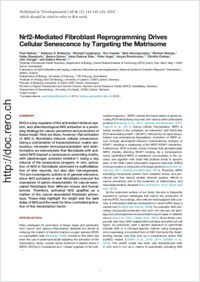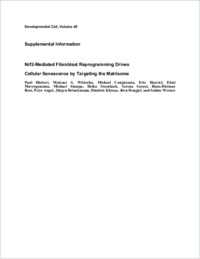Nrf2-mediated fibroblast reprogramming drives cellular senescence by targeting the matrisome
- Hiebert, Paul Institute of Molecular Health Sciences, Department of Biology, Swiss Federal Institute of Technology (ETH) Zurich, Switzerland
- Wietecha, Mateusz S. Institute of Molecular Health Sciences, Department of Biology, Swiss Federal Institute of Technology (ETH) Zurich, Switzerland
- Cangkrama, Michael Institute of Molecular Health Sciences, Department of Biology, Swiss Federal Institute of Technology (ETH) Zurich, Switzerland
- Haertel, Eric Institute of Molecular Health Sciences, Department of Biology, Swiss Federal Institute of Technology (ETH) Zurich, Switzerland
- Mavrogonatou, Eleni Laboratory of Cell Proliferation and Ageing, Institute of Biosciences and Applications, National Centre for Scientific Research ?Demokritos?, Athens, Greece
- Stumpe, Michael Department of Biology, University of Fribourg, Switzerland
- Steenbock, Heiko Institute of Virology and Cell Biology, University of Lübeck, Germany
- Grossi, Serena Faculty of Medicine, University of Zürich, Switzerland
- Beer, Hans-Dietmar Faculty of Medicine, University of Zürich, Switzerland
- Angel, Peter Division of Signal Transduction and Growth Control, German Cancer Research Center (DKFZ), Heidelberg, Germany
- Brinckmann, Jürgen Institute of Virology and Cell Biology, University of Lübeck, Germany - Department of Dermatology, University of Lübeck, Germany
- Kletsas, Dimitris Laboratory of Cell Proliferation and Ageing, Institute of Biosciences and Applications, National Centre for Scientific Research ?Demokritos?, Athens, Greece
- Dengjel, Jörn Department of Biology, University of Fribourg, Switzerland
- Werner, Sabine Institute of Molecular Health Sciences, Department of Biology, Swiss Federal Institute of Technology (ETH) Zurich, Switzerland
-
16.07.2018
Published in:
- Developmental Cell. - 2018, vol. 46, no. 2, p. 145-161.e10
English
Nrf2 is a key regulator of the antioxidant defense system, and pharmacological Nrf2 activation is a promising strategy for cancer prevention and promotion of tissue repair. Here we show, however, that activation of Nrf2 in fibroblasts induces cellular senescence. Using a combination of transcriptomics, matrix proteomics, chromatin immunoprecipitation and bioinformatics we demonstrate that fibroblasts with activated Nrf2 deposit a senescence-promoting matrix, with plasminogen activator inhibitor-1 being a key inducer of the senescence program. In vivo, activation of Nrf2 in fibroblasts promoted re-epithelialization of skin wounds, but also skin tumorigenesis. The pro-tumorigenic activity is of general relevance, since Nrf2 activation in skin fibroblasts induced the expression of genes characteristic for cancer-associated fibroblasts from different mouse and human tumors. Therefore, activated Nrf2 qualifies as a marker of the cancer-associated fibroblast phenotype. These data highlight the bright and the dark sides of Nrf2 and the need for time-controlled activation of this transcription factor.
- Faculty
- Faculté des sciences et de médecine
- Department
- Département de Biologie
- Language
-
- English
- Classification
- Biological sciences
- License
-
License undefined
- Identifiers
-
- RERO DOC 322804
- DOI 10.1016/j.devcel.2018.06.012
- Persistent URL
- https://folia.unifr.ch/unifr/documents/307353
Other files
Statistics
Document views: 115
File downloads:
- pdf: 443
- Supplementary material: 177

